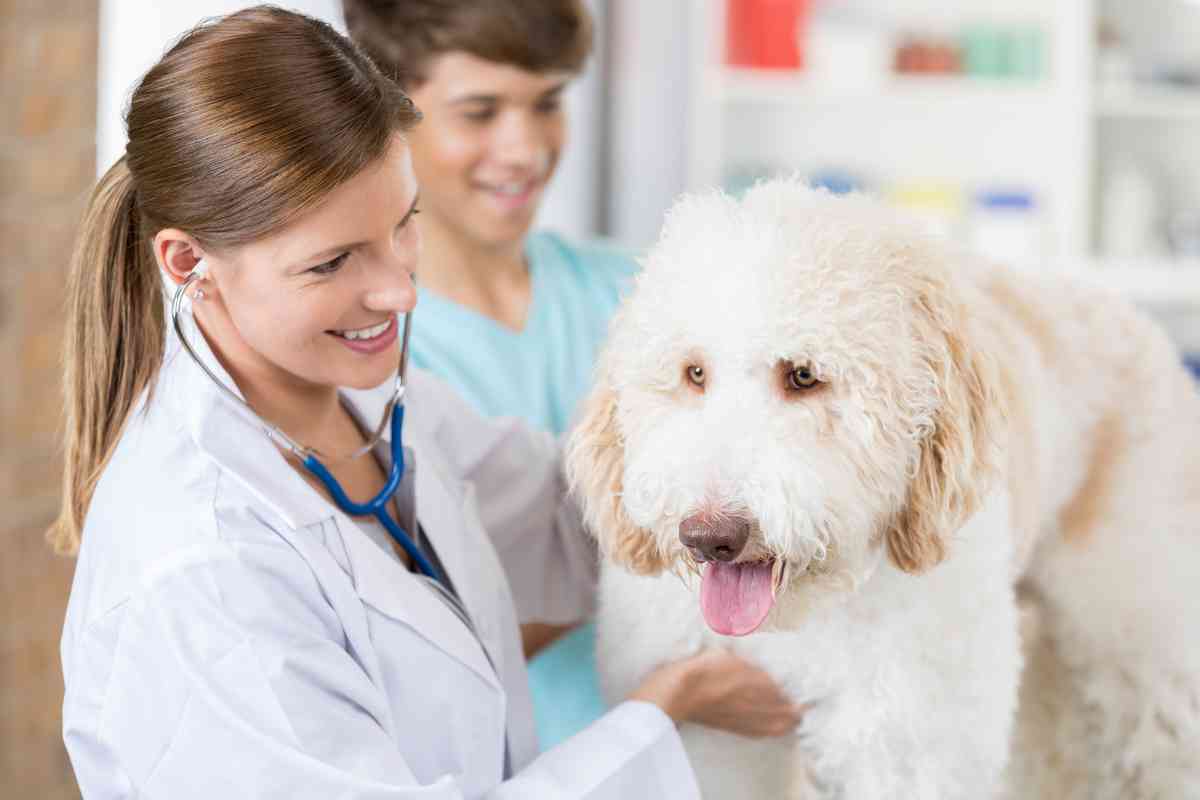Goldendoodle Cancer: Vet Explains 3 Common Types
Goldendoodles are very commonly seen in many households. While there are many things that you can do to keep your Goldendoodle healthy and happy, eventually, just like people, they will get sick. You may have heard that these are healthy dogs, so if you’re wondering “Do Goldendoodles get cancer?” then prepare yourself for the unfortunate reality of this lovely breed.

Are Goldendoodles prone to cancer?
Goldendoodles are prone to multiple types of cancer, including Hemangiosarcoma in their blood, Osteosarcoma in their bones, and Lymphoma in their lymphatic system. They are also prone to other diseases, like Addison’s and von Willebrand’s disease.
If your Goldendoodle is sick or does not seem like they are feeling better, it would be best that your Goldendoodle sees your vet right away. Some health issues re extremely serious and require immediate life-saving intervention.
There are some of the most common health issues and what you can do to help your Goldendoodle feel much better.
Goldendoodle Cancer Signs
As your Goldendoodle ages, you may see many lumps and bumps appear. These may just be small fatty masses, but they can also be cancerous.
Your vet will take a very small sample of the tumor with a needle and look at these cells under the microscope to help you determine if they are malignant masses or not.
Many signs would lead you to think that your Goldendoodle has cancer, including:
- Diarrhea
- Vomiting
- Weight loss
- Actually, seeing a growth
If dog owners notice any of these signs in their Goldendoodle, your veterinarian can run different tests to see if your Goldendoodle has cancer and help you decide on the best possible treatment route for your dog.
Golden Retrievers are a common breed of dog that gets cancer. This can be a genetic issue that can be passed on to their offspring.

What’s’ the most common cancer in Goldendoodles?
The most common cancers seen in Goldendoodles are:
- Hemangiosarcoma
- Osteosarcoma
- Lymphoma
Hemangiosarcoma
Hemangiosarcoma is a type of cancer seen in your Goldendoodle’s blood vessels.
These blood vessels are located everywhere in your dog’s body including the skin and other major internal organs.
The most frequent sites where hemangiosarcoma can be found are the spleen, liver, and heart.
Hemangiosarcoma is one of the most common splenic tumors that is seen in dogs and is especially common in Goldendoodles.
This type of cancer is locally aggressive and highly metastatic, meaning it will quickly and easily spread to other organs.
What causes hemangiosarcoma in Goldendoodles?
The cause of hemangiosarcoma is unknown but it can be due to genetics. This is often seen in Goldendoodles over 8 years of age.
Hemangiosarcoma can be seen in smaller and younger dogs, too but is more common in large older breed dogs.
Signs of Hemangiosarcoma in Goldendoodle
There are signs that your vet would be looking at to indicate that your Goldendoodle may have hemangiosarcoma.
The common signs that your Goldendoodle may have hemangiosarcoma are:
- Enlarged abdomen
- Pale white gums
- Lethargic
- Unexplained weight loss
- Decrease exercise
- Panting
- Decrease appetite
- Collapse
If you notice any of these signs in your Goldendoodle, it would be best to take your Goldendoodle to the vet right away.
Your vet will examine your Goldendoodle and see if they also think that your Golendoole has hemangiosarcoma or if your dog has another disease, causing them to show these signs and symptoms.
How is Hemangiosarcoma diagnosed?
There are different things that your vet may want to do to help them diagnose your Goldendoodle with hemangiosarcoma.
The only way to know for sure if your Goldendoodle has hemangiosarcoma is to take a biopsy of the mass and send it to a veterinary pathologist for review.
The pathologist takes a thin slice of the mass and will look for signs of cancer under the microscope.
There are blood tests and non-invasive procedures that would also lead your vet to think that your Goldendoodle may have hemangiosarcoma.
These are common tests that your vet may want to run:
- CBC and Blood Chemistry Panel: this will show if your Goldendoodle has a low red blood cell count. This would indicate that your Goldendoodle may have a mass inside that is bleeding.
- Radiographs: Your vet may want to take radiographs of your Goldendoodle’s abdomen or chest and see a mass on the liver or spleen.
- Abdominal Ultrasound: Your vet can ultrasound your Goldendoodle’s abdomen to see if there is a mass present on their liver or spleen. This will help them determine if the mass is bleeding into their abdomen.
- FNA and cytology. If your vet can see the mass with an ultrasound, they can stick a needle into the mass and take a few cells. Your vet will look at these cells under the microscope to see if they see cells are cancerous.
- Biopsy. The best way to tell if your Goldendoodle has hemangiosarcoma is for your vet to surgery to remove the mass and send it off to a veterinary pathologist. While this is the most invasive and possibly the most expensive way to tell what type of tumor your Goldendoodle has, it is the most accurate.

How to Treat Hemangiosarcoma in Goldendoodles
There are many different treatments for hemangiosarcoma. These are some of the most common treatment methods for hemangiosarcoma in Goldendoodles
Surgery
A splenectomy is the best treatment for hemangiosarcoma in the spleen, which is the main organ affected by this type of cancer.
Depending on the organs that the mass involves these organs may be able to be partially removed. Your Goldendoodle can live without parts of their liver, and if only a small part is effective, it can often be removed.
Chemotherapy
Chemotherapy is recommended after splenectomy to help prevent or treat any part of the tumor that has spread to other organs in your dog’s body.
With chemotherapy and surgery, you can increase the survival time of your Goldendoodle with hemangiosarcoma.
Most Goldendoodles will tolerate chemotherapy very well and will maintain a very good to excellent quality of life even during their chemotherapy treatment. Doxorubicin is a chemotherapy drug that is most commonly used to treat Goldendoodle with hemangiosarcoma.
Your Goldendoodle will receive a chemotherapy injection every three weeks for 5 to 6 dosages total.
This is started a few weeks after your Goldendoodle has recovered from surgery. This is an injectable medication that has to go in your Goldendoodle’s vein, so your dog will most likely need to stay the day at your vet clinic.
Chemotherapy is often done by a veterinary oncologist. So, your vet may want to refer your Goldendoodle to a veterinary oncologist for their chemotherapy treatment.
A veterinary oncologist has specialized training beyond veterinary school to help them properly treat and manage different types of cancers.
There are other chemotherapy drugs that your vet can be used to treat your Goldendoodle with hemangiosarcoma. Your vet will determine the best route of treatment.
Most Goldendoodles do not have the side effects with chemotherapy like we think of with people since the dosages are not as high. Discuss the different side effects and benefits of the chemotherapy with your vet.
Prognosis of hemangiosarcoma in Goldendoodle?
The prognosis for hemangiosarcoma with surgery only is poor. The median survival time in Goldendoodles treated with only surgery is about 1 to 3 months, and less than 10% of dogs survive to one year.
Chemotherapy helps improve the survival time to about 6 months, using the doxorubicin-based protocol. A low-grade tumor may have a better prognosis, especially if chemotherapy is given to your Goldendoodle after surgery.
Osteosarcoma
This is cancer that affects your Goldendoodle’s bone.
The areas that it commonly affects are the wrist, shoulder, and knee. If your Goldendoodle does have osteosarcoma, you will notice swelling of the bone in that location, limping and pain in their joints.
Your vet can take an x-ray to see if your Goldendoodle has bone cancer or if there is another issue causing these signs.
If your Goldendoodle does have bone cancer, the gold standard treatment is amputation of the affected leg and chemotherapy.
With aggressive treatment, the prognosis is about 1 year. With just amputation alone most Goldendoodles will survive for about 6 months. With no treatment, most Goldendoodles only live for 2 to 3 months after their initial diagnosis.
Lymphoma
Lymphoma is cancer found in your Goldendoodle’s lymphatic system. This cancer causes the lymph nodes in your Goldendoodle’s neck, and legs to become enlarged.
There are even lymph nodes in your Goldendoodles chest and abdomen that can also be affected. Goldendoodle’s who have lymphoma can undergo chemotherapy to help extend their life.
Your vets will recommend the CHOP protocol which is a different chemotherapy drug that your Goldendoodle receives each week to help kill the cancer cells and shrink the size of the lymph nodes.
Common Cancer In Goldendoodles Comparison Chart

Here is a comparison chart outlining the key information about the three cancers mentioned:
| Cancer | Hemangiosarcoma | Osteosarcoma | Lymphoma |
|---|---|---|---|
| Definition | Cancer of blood vessels | Bone cancer | Cancer of lymphatic system |
| Common sites | Spleen, liver, heart, skin, organs | Wrist, shoulder, knee | Lymph nodes, chest, abdomen |
| Age of onset | More common in older dogs | Any age, but usually older dogs | Any age |
| Signs and symptoms | Enlarged abdomen, pale gums, lethargy, weight loss, decreased appetite | Swelling of affected bone, limping, joint pain | Enlarged lymph nodes in neck, legs; may vary based on affected area |
| Diagnosis methods | Biopsy, blood tests, radiographs, ultrasound, cytology | X-ray, biopsy | Biopsy, blood tests, lymph node biopsy |
| Treatment options | Surgery, chemotherapy | Amputation, chemotherapy | Chemotherapy |
| Prognosis | Poor prognosis with surgery alone; chemotherapy improves survival time | Aggressive treatment: about 1 year; amputation alone: about 6 months | Chemotherapy can extend life expectancy |
Please note that the information provided is a general overview and may vary depending on individual cases. It is always best to consult with a veterinarian for a proper diagnosis and treatment plan tailored to your specific dog.
Other Goldendoodle Health Issues
Goldendoodles are, unfortunately, prone to many different health issues. For an in-depth review of all non-cancerous Goldendoodle health issues, check out our guide at the link below.
Hip Dysplasia
Hip dysplasia is a genetic disease that affects the hip joint of Goldendoodles. It occurs when the ball portion of the femur and the hip socket do not align properly, leading to bone-on-bone contact and inflammation. Symptoms include bunny hopping, short strides of the hind legs, difficulty jumping, muscle atrophy, and sensitivity in the rear end.
Sebaceous adenitis
Sebaceous adenitis (SA) is a hereditary skin disease that causes progressive hair loss and inflammation of the sebaceous glands. Symptoms include scaling, odor, lesions, scabs, matted hair, hair loss, and secondary infections. SA cannot be cured but symptoms can be treated.
Eye issues
Cataracts cause clouding of the eye’s lens, affecting vision. Surgical treatment like phacoemulsification can remove the cataract and replace it with an artificial lens. Progressive retinal atrophy is a hereditary condition that leads to progressive vision loss. Peripheral vision may be retained initially but complete blindness will occur.
Bloat
Bloat is a serious condition in Goldendoodles where the abdomen fills with air, causing pressure on the heart and lungs. Fast eating and excessive air swallowing contribute to bloat. Signs include a bloated abdomen, difficulty breathing, vomiting, and discomfort when lying down. Immediate veterinary attention is crucial.
Addison’s Disease
Addison’s Disease is caused by the destruction of the adrenal glands’ outer layer. It can be triggered by the immune system, certain drugs, or cancer. Symptoms include increased thirst, urination, vomiting, upset stomach, weakness, loss of appetite, and shaking.
Allergies
Common Goldendoodle allergens include pollen, dust mites, mold spores, and certain chemicals. Allergic reactions in Goldendoodles can manifest as itching, redness, ear infections, or respiratory issues. Identifying and avoiding allergens can help manage their allergies effectively.
Luxating Patellas
Patellar luxation, a condition more frequently observed in Miniature Poodle/Retriever crosses, can result in your Goldendoodle limping and lameness, particularly in overweight individuals. It occurs when the kneecap groove is misaligned or weak, making knee dislocation more likely to occur.
Ear Infections
Goldendoodles are prone to ear infections due to their floppy ears, which can trap moisture, dirt, and debris. Allergies, hair in the ear canal, and poor ventilation contribute to infections. Regular cleaning and grooming can help prevent and treat ear infections in Goldendoodles.
Arthritis
Arthritis is a condition that affects dogs as they age, causing joint pain and cartilage deterioration. Common signs of arthritis include limping, difficulty walking, and trouble standing after prolonged rest. Veterinarians can prescribe medications, supplements, or surgery to alleviate the pain.
Gastrointestinal issues
Gastrointestinal issues in Goldendoodles present various signs, including vomiting, diarrhea, drooling, loss of appetite, and blood or mucus in the stool. Common causes include pancreatitis, obstructions, parasites, dietary indiscretion, and organ failure.
Obesity

Obesity in pets can contribute to several health issues, including joint pain, arthritis, heart health issues, and respiratory difficulties. To help your overweight Goldendoodle lose weight, increase their exercise and reduce their food intake.
Epilepsy
Epilepsy in dogs refers to recurring seizures caused by abnormal electrical activity in the nervous system. Seizure signs include collapsing, foaming at the mouth, leg paddling, and thrashing. Immediate veterinary attention is required